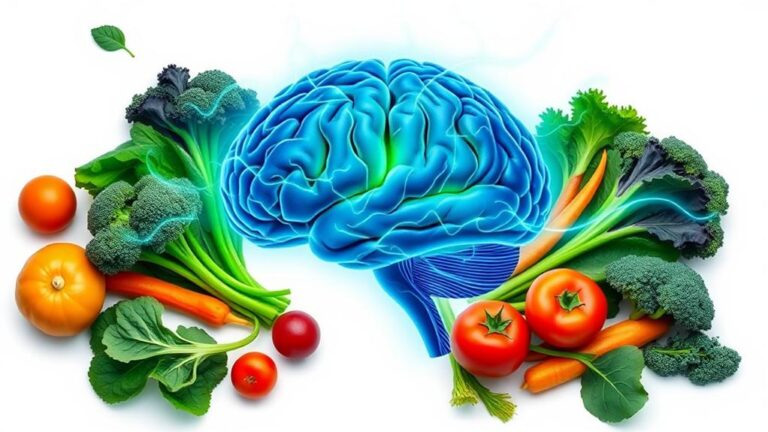Did you know that studies suggest low carb diets can increase fat burning by up to 300%? By shifting your body's primary fuel source from carbohydrates to fats, you might experience not just weight loss but also more stable energy levels throughout the day. This shift can reduce those frustrating energy crashes and improve your mental clarity—both of which are essential for productivity. But how exactly do these changes manifest in your daily life, and what other benefits might you discover?
Enhanced Fat Burning
When you adopt a low carb diet, your body shifts into a state of ketosis, where it efficiently burns fat for energy instead of carbohydrates. This change allows you to tap into your body's fat stores, leading to enhanced fat burning.
As you reduce your carb intake, insulin levels drop, which helps facilitate the release of fatty acids from your fat cells. These fatty acids are then converted into ketones, a potent energy source. Typically, a keto-friendly carb intake ranges from 20 to 50 grams per day, which is sufficient to maintain ketosis and promote fat burning.
You'll likely notice a significant increase in energy levels as your body becomes more efficient at using fat for fuel. Unlike carbohydrates, which can cause energy spikes and crashes, fat provides a more stable source of energy.
This means you can enjoy sustained endurance throughout the day, whether you're exercising or tackling daily tasks.
Additionally, since fat is denser in energy than carbohydrates, you'll find that you can feel more energized with less food. This process not only supports weight loss but also enhances your overall energy efficiency.
Embracing a low carb diet sets the stage for your body to become a fat-burning machine, allowing you to enjoy life with increased energy and stamina.
Stabilized Blood Sugar Levels
By minimizing carbohydrate intake, you can effectively stabilize your blood sugar levels. When you reduce carbs, your body relies more on fat for energy, which leads to fewer spikes and crashes in blood sugar. This steady energy flow enhances your overall energy and helps maintain focus throughout the day.
Here's a quick overview of how low carb diets impact blood sugar levels:
| Benefit | Description |
|---|---|
| Reduced Blood Sugar Spikes | Fewer carbs mean less sugar entering the bloodstream. |
| Improved Insulin Sensitivity | Your body becomes more efficient at managing blood sugar. |
| Consistent Energy Levels | You'll experience a more stable energy supply without sudden drops. |
| Decreased Hunger Pangs | Stable blood sugar levels help curb cravings. |
| Enhanced Mood Stability | Balanced blood sugar can improve your mood and mental clarity. |
When your blood sugar levels are stable, you can focus better and feel more energized. Adopting a low carb diet not only supports your physical health but also contributes to emotional well-being, making it a win-win for your daily life.
Reduced Energy Crashes
Stable blood sugar levels play a significant role in preventing energy crashes throughout the day. When you're on a low-carb diet, your body relies on fat for fuel rather than quick-digesting carbohydrates. This shift helps maintain steady energy levels, reducing those frustrating peaks and valleys you might experience with high-carb meals. The ketogenic diet is an example of a low-carb eating plan that can induce ketosis, where the body burns fat for energy instead of glucose, potentially leading to increased energy levels.
You might notice that after eating a heavy pasta dish or sugary snack, you feel an initial burst of energy, followed by a rapid decline. This crash can leave you feeling sluggish and unfocused. By choosing low-carb options, you minimize these spikes and crashes, allowing for a more consistent flow of energy throughout your day.
Additionally, low-carb diets often encourage higher protein and healthy fat intake, which can also promote satiety. When you feel full and satisfied, you're less likely to reach for quick, sugary snacks that can lead to energy dips.
Instead, you'll maintain a steady energy level, allowing you to tackle your tasks without the dreaded afternoon slump. Incorporating low-carb meals into your routine can help you enjoy more sustained energy, making it easier to stay productive and focused throughout the day.
Improved Mental Clarity
Throughout the day, many people experience moments of mental fog and distraction, but a low-carb diet can help clear the haze. By reducing your carbohydrate intake, you encourage your body to rely on fat for fuel, which can lead to a more stable supply of energy for your brain.
When you cut down on sugar and refined carbs, you avoid those sudden spikes and crashes in blood sugar that often leave you feeling lethargic and unfocused. This process, known as ketosis, can lead to improved brain function and reduced inflammation, contributing to better overall mental clarity.
As your body adapts to this new fuel source, you might notice a significant improvement in your mental clarity. Tasks that once felt overwhelming can become easier to tackle.
You'll find that your concentration improves, allowing you to focus on important projects without constant interruptions from distractions.
Moreover, many people report feeling more alert and mentally sharp when following a low-carb diet. This enhanced cognitive function can make a real difference in your daily productivity and decision-making abilities.
When you're not battling mental fog, you can engage more fully with tasks, contributing to a greater sense of accomplishment and satisfaction throughout your day.
Increased Physical Endurance
How does a low-carb diet enhance your physical endurance? When you reduce carbohydrate intake, your body becomes more efficient at burning fat for fuel. This shift can lead to sustained energy levels during workouts and prolonged physical activities.
As your body adapts, you may notice significant improvements in your endurance.
Here are some key benefits of increased physical endurance on a low-carb diet:
- Enhanced Fat Utilization: Your body learns to tap into fat stores, offering a steady energy source.
- Stable Blood Sugar Levels: Lower carbs mean less sugar spikes, which helps maintain energy without crashes.
- Reduced Inflammation: A low-carb diet can decrease inflammation, aiding recovery and performance.
- Improved Aerobic Capacity: Studies suggest low-carb diets can boost your ability to sustain longer aerobic activities.
- Increased Mental Focus: With better energy levels, you can concentrate on your physical goals without distractions.
Conclusion
To sum up, low carb diets can notably boost your energy levels by enhancing fat burning and stabilizing blood sugar. Did you know that individuals on low carb diets often report a 50% increase in endurance during physical activities? By minimizing energy crashes and improving mental clarity, you'll find it easier to stay focused and productive throughout the day. So, if you're looking for a natural way to feel more energized, a low carb approach might be just what you need!



